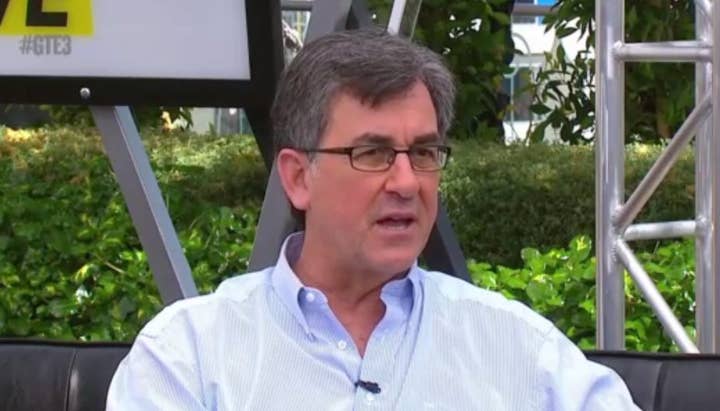The events that will define 2016
We pick analysts' brains to get their predictions on Nintendo, the mobile market, eSports, VR and much more
As GamesIndustry.biz winds down for 2015, it's a perfect time for a little bit of fun: predictions. 2016 should prove to be a very interesting year for the industry, with business models and platforms continually evolving. Will VR's hype actually translate into commercal success when the first headsets start shipping? Will Nintendo shed some light on its NX platform? Can Microsoft catch up to Sony in the console race? How will the mobile gaming landscape change? Can Activision and EA succeed in eSports? Some of these questions may be answered in the next 12 months and some won't.
To help shed some light on next year's industry trends, we asked some of the top analysts to give us a peek into their crystal balls; we've also requested that they revisit and evaluate their past year's predictions. And, to get a sense of what prognostications the GI.biz staff has in mind, check out the sidebar on this article for our own thoughts on 2016.
Michael Pachter, Wedbush Securities

Last year, I predicted that Activision would gain traction in free-to-play, and said that I thought they would exceed $500 million in revenue in 2015. Through three quarters, it appears that they are on track, but Call of Duty Online has been disappointing so far, and hasn't contributed much. I actually thought Overwatch would be free-to-play, and they surprised me by announcing that it is a $59.99 console/$39.99 PC game.
I also predicted that Sony's exclusives would keep it in the lead. I suppose I was right about their ability to maintain the lead, but it appears it's because Sony has a more powerful global brand, and not necessarily attributable to the exclusives. If anything, it looks like the tie-in with Destiny and early access to Call of Duty expansions has been a bigger factor than first-party exclusives.
I predicted that Microsoft would be first to blink, and would cut price to $349. Check. Enuff said.
I predicted that Nintendo would fail to re-ignite western third-party support. Check. Also 'nuff said.
I predicted Microsoft would do something "interesting" with Minecraft and that Amazon would do something "interesting" with Twitch. Neither occurred, although the concept of "interesting" is in the eye of the beholder. Both companies essentially kept their respective prize acquisitions on the path they were on prior to being bought, which isn't a bad thing at all, but I missed on this one.
This year, I think we'll see:
- Sony abandoning the PS Vita. They have been flailing to make the Vita a success, third parties have backed away, and it's clear that this device has a limited life.
- Nintendo's first mobile "game" will flop. Miitomo will get 100 million downloads, so it will be a "success" in terms of users, but it will drop out of the top 100 grossing games on iOS and Android by year-end 2016. I think people will try it, but don't think they'll find social chat compelling enough to spend money. In my opinion, Miitomo offers little that isn't already widely available on Facebook; younger consumers not on Facebook will probably find it appealing, but they typically have little or no access to credit, so Nintendo will have trouble monetizing Miitomo.
"Activision's first joint effort with King will be a Skylanders driving game... I could see a racing game using Skylanders Superchargers IP as having a lot of potential"
Michael Pachter
- Nintendo's second mobile game will be a resounding success. I actually think Miitomo is intended to be a platform that allows people to create a personalized image/character and use it in other Nintendo games. I am hopeful that the second effort is something more familiar, such as a Super Mario platformer. If so, I think the game will attract 200 million downloads and will be a top 20 (or possibly top 10) grossing game on both iOS and Android.
- The NX won't come out in 2016. Nintendo has a history of announcing consoles in one year and launching the next, and I don't see the NX as deviating from that pattern.
- Activision's first joint effort with King will be a Skylanders driving game. I think that King is competent to get in the driving category, and I could see a racing game using Skylanders Superchargers IP as having a lot of potential. Although I think that the most compelling joint effort would be a tower defense game built in the World of Warcraft universe (WoW Dungeon Defender?), I think that will take more than a year to build, so I will save it for my 2017 predictions.
- The Assassin's Creed movie will be a modest success. I was initially skeptical of the casting of Michael Fassbender in the lead role, but now that he's being mentioned as a Best Actor front-runner for his role as Steve Jobs, I think that the Assassin's Creed movie will attract a lot more media attention.
Patrick Walker, EEDAR

Last year, I predicted Clash of Clans would finally be displaced from the top grossing spot in the US iOS app store in 2015 after several years in the top spot. This came true, as Fire Age has held the top grossing spot for most of this year. Interestingly, Fire Age was also recently displaced as the top grossing app... by Clash of Clans again. The mobile market remains saturated with very little movement in the top ranks. This won't change in 2016.
I made a prediction about VR last year that I still believe will come true; it has just ended up being a prediction for the beginning of 2016 and not 2015. I predicted that VR would reach the consumer market in 2015 and provide a high-quality consumer experience, but would still struggle to find mass market success. As we finally approach the launch of several major VR platforms, the barriers to mainstream success (especially the high price point of a fully capable hardware setup) are also becoming apparent. Which leads to my first prediction for 2016:
VR will launch to critical success and strong consumer buzz, but pricing and other barriers will limit mass market adoption in 2016.
This will doom many of the startups in the space, but the major platform players will prevail and find success within several years.
Throughout 2015, I attended several VR conferences, met with many VR developers, and sat on a few VR panels. I noticed a common theme across my interactions: people are bullish on VR in the long term because of the possibilities, but very few are bullish in the short term because of pricing and content barriers. I believe that VR is long play, and I believe that the companies launching platforms next year are well positioned to grow VR into a mainstream entertainment experience. The many startups that are banking on a rising VR tide but lack the deep pockets of Facebook, Valve, HTC, Samsung, and Sony will be in trouble, though.
eSports will continue to grow in revenue, advertisers, viewership, and infrastructure, but the industry buzz will actually decline as a deeper understanding of eSports emerges.
"People are bullish on VR in the long term because of the possibilities, but very few are bullish in the short term because of pricing and content barriers"
Patrick Walker
Looking back, I would say that the rapid growth and industry excitement around eSports was probably the biggest gaming story of 2015 (Of note: not one of the 10 analysts or GI.biz staff members mentioned it in a prediction last year). My prediction is that while eSports will continue to grow at a steady pace, and more large companies will continue to enter the supply chain as content producers, advertisers, leagues, and viewing platforms, the overall buzz will subside as knowledge grows. eSports is definitely not a fad and represents the broader theme of growing diversity in gaming engagement, but eSports is still misunderstood by many in the industry. eSports is not a fit for the majority of gaming experiences and the whole ecosystem still generates less revenue in a year than many individual games. As the industry understands eSports more fully, the hype will fade a bit, but in its place will remain a gaming segment with a long term, bright future.
India will become the new Asia in mobile gaming, but this will also be the year when the mobile market truly slows.
As we end 2015, the Asian mobile markets are starting to show the same signs of device saturation and revenue growth decline that the Western markets experienced in 2014. Mobile publishers are already showing interest in the emerging markets, but this push will happen in earnest in 2016. India will become the hot market, but as with the APAC regions, localization will be critical to success. Unfortunately, the untapped markets do not have the same revenue potential as the APAC regions and this will be the year that worldwide mobile gaming revenue growth slows significantly.
Nintendo's NX's unique selling point will be the ability to link the console with multiple handheld devices.
One thing that the modest performance of the Wii U has shown Nintendo is that a platform needs a significant selling point beyond Nintendo IP to gain third-party support and mainstream adoption. The Wii brought motion gaming to the masses and enjoyed breakout success, but the Wii U's half-baked console/handheld approach failed to drive the same level of consumer interest. Nintendo's press announcements, early rumors, Nintendo's continued support of the handheld market, and the lack of a full commitment of Nintendo premier IP into mobile suggests that Nintendo will likely try to merge the console and handheld markets in the NX. Support for multiple handhelds is likely, considering Nintendo's broader handheld strategy of having multiple handheld devices in a single household.
AAA game development will mostly see the continuation of major trends. Specifically:
- Open-world gaming will continue to reign, being incorporated into even more AAA franchises.
- The games as a service business model will become the strategic framework for most AAA games.
- World customization will be a significant feature of many titles. Many world building titles will be released in 2016 (Dragon Quest Builders, Boundless, Lego Worlds) with the goal of capturing the eyeballs and pocketbooks of the Minecraft audience.
However, the marketing, distribution, release, and business model of games will continue to shift.
- AAA marketing campaigns will continue to shorten. We will see a major title be announced and launched within the space of a few months.
- 2016 will be the year a F2P game is a major financial success on the consoles.
- Pre-launch mobile apps will become a common part of the AAA launch campaign. Based on the success of Fallout Shelter, purveyors of large, popular licensed franchises will attempt to replicate Fallout's success with Fallout Shelter. At least two of these attempts will hit, and generate upwards of $25 million in revenues before the main title even launches.
- DLC will continue to release longer after the base game. Season Passes have become a mainstay of every major release and it's no longer uncommon to see DLC release more than a year after the base game.
- One of the biggest titles of the year will come in under the radar and grow from organic fan support rather than press and marketing.
- A major publisher will create a toys-to-life product in a completely new type of IP, such as a sports figurines. My prediction is that EA will launch a toys-to-life game with one of their sports franchises.
And finally, a positive prediction for the industry:
Increased diversity in the types of characters portrayed in games
The past year has seen the beginning of a trend towards more diversity in video game protagonists. For example, both Sony and Microsoft had a headlining game at E3 starring a female protagonist (Horizon: Zero Dawn and Rise of the Tomb Raider), and 2016 will continue this trend. Upcoming 2016 games with female protagonists include Overwatch, Mirror's Edge Catalyst, Battleborn, Horizon: Zero Dawn, Gravity Rush 2, and Hellblade. This speaks to a growing awareness of the huge percentage of gamers who'd like to see broader representation of the sexes in games, and that's terrific as it potentially broadens the appeal of gaming to a wider audience.
Billy Pidgeon, independent analyst

This time last year I predicted that the audience for casual and hardcore games would grow significantly in 2015 in contrast to an apparent 2014 plateau. There has been growth, but not as much as I expected. I remain optimistic on audience growth over the next few years.
I held that PS4 would not maintain out of the gate performance and that Xbox One would match installed base numbers. Turns out I was partially correct but mostly wrong. PS4's lead against Xbox One has narrowed quite a bit in the North American region, but PS4 hardware sales in Europe remain strong and Xbox One lags far behind in EU, Japan and the rest of the world. I still believe that toward the end of this console cycle, the gap between the top two systems will be narrower than in the previous generation. It's important to note that Sony has been generally more aggressive on hardware price cuts than Microsoft, and this has helped PS4 retain a competitive lead.
Last year I predicted the revenue and unit volume from retail sales of packaged console games would be far more likely to decrease rather than increase in 2015. The numbers are not yet out, but I expect large increases in revenue and units of digital sales will offset packaged games considerably when the numbers are in. The combined numbers for packaged and digital games should show strong year-over-year growth.
In 2015 I predicted double-digit growth for digital revenue. Again, the numbers aren't yet in, but I believe we're on track to achieve double-digit growth.
"VR and AR will transform games and interactive applications, but most gamers aren't going to want it or need it until sometime between 2017 and 2020"
Billy Pidgeon
Last year I said despite higher production values accessible through bigger budgets, we'd see disappointing progress in smartphone games in three key areas: (1) quality gameplay (2) monetization through consumer friendly strategies and (3) integration of compelling social features. While I'd hoped to be proven wrong on this one, I was quite correct: the evolution of smartphone games has remained depressingly stunted.
I said in 2015 we'd begin to see applications including (but not limited to) games demonstrating superior experiences available for virtual reality and augmented reality tech. I'm wrong on this one. I was clearly too optimistic on the timeline, as the tech is not yet widely available, although development continues apace.
Finally, I predicted that growth in revenue from mobile advertising and mobile sales transactions would outstrip revenue increases from sales of virtual goods via free-to-play monetization. I'm still looking at these numbers to check my accuracy, but it looks like mobile ads and sales revenue hasn't spiked. This mostly hasn't happened in North America and Europe, where mobile advertising is still undervalued and underutilized, but is more likely in Asia and the rest of the world. Revenue from F2P virtual goods sales remains dominant in North America, but it is not yet clear whether this represents strong growth rather than status quo.
So here are my 2016 predictions:
- The hype surrounding augmented reality and virtual reality will continue to build, resulting in a backlash of justifiable criticism due to delayed delivery and high expectations.
I believe VR and AR will eventually deliver exciting gameplay, but although hardware will be available in 2016, the technology will not drive more than a few must have games next year. I think we will begin to see demonstrations of satisfying experiential results from the strong development investments in VR and AR games and non-game apps toward the end of 2016. VR and AR will transform games and interactive applications, but most gamers aren't going to want it or need it until sometime between 2017 and 2020.
- Nintendo's new NX system will represent a wholesale rethinking of online games, community and digital commerce for the company.
While Nintendo is relatively late to fully embrace remote connected gaming and commerce, I believe Nintendo's new network and hardware will deliver an evolved multiplayer gameplay experience. NX will rightly be positioned as a system and network separate from Wii U and 3DS. 3DS will remain a thriving system for a number of years. Although Nintendo will sell more Wii U hardware as more highly anticipated franchises become available for the system next year, the system has lagged too far behind the competition to remain viable for most third-party publishers and should be managed accordingly. NX may be released this year, but Nintendo would be wise to delay launch until a number of quality launch titles are ready to ship.
- Revenue from free-to-play will continue to gain momentum across platforms.
Revenue from F2P microtransactions increased significantly in 2015. While much F2P revenue derives from mobile games for Apple and Android devices, microtransactions for free PC games demonstrated very strong growth. This will continue in 2016, and accurate reporting will reveal that F2P games on the PC platform are responsible for greater revenue growth than games for mobile platforms in markets with high availability of connected PCs.
- Boxed games sold at specialty and big box stores and online will continue to show year-over-year declines, and these will be sharper starting this year (2015) and next.
This is not good news for GameStop, but will result in greater margins for publishers and connected retail network operators. Paid digital downloads were responsible for major revenue growth in 2015, and an accurate accounting will show that the games and add-ons responsible for this growth were not only on connected consoles but also on the PC platform. Much of this revenue was purchased or gifted as pre-paid cards purchased at brick and mortar retail, but online purchases should show greater growth for 2016 and will grow more rapidly than prepaid card purchases.
- In 2016 Sony and Microsoft will continue to make large gains in PS4 and Xbox One installed base in North America, Europe and the rest of the world.
Sales of current generation hardware have been strong, but have been tempered somewhat by the extended viability of PS3 and Xbox 360. As most last generation players catch up and more single console owners purchase another, the number of active consoles will grow in 2016 and further out. Still, with upgrades to current generation and more consoles per household, attach rates may be disappointing as players have more platforms to play on and more available quality games than they have time to play.
David Cole, DFC Intelligence

On last year's predictions:
Our prediction that the indie scene would grow in importance was a safe one and it has clearly occurred. Much of DFC's work has been on the growth of console digital which has really been spurred by indie games in 2015. DFC predicted Xbox One possibly catching up with PlayStation 4 in the U.S. with Sony dominating the rest of the world... but Sony has so far extended its lead in the U.S. even with the lack of big exclusives. As for the rest of the world, the Xbox One is looking even worse than we thought possible.
The prediction of a consumer backlash against glitchy games is fairly hard to estimate. We cited SimCity as an example and would note that in 2015 publisher Paradox Interactive released the game Cities: Skylines from small Finnish developer Colossal Order. Cities: Skylines improved on much of what was wrong with SimCity and consumers awarded the game accordingly with very strong sales.
In terms of connecting television to other devices to play games we saw some movement in 2015 but we would definitely not describe 2015 as a breakthrough year. However, companies like Amazon and Nvidia are slowly introducing more streaming devices that have long-term potential to be disruptors in the game business.
For 2016:
- Microsoft Struggles
2016 is likely to be a very difficult year for Microsoft. They are moving on many fronts but struggling in almost all areas when it comes to consumer entertainment and services. There is likely to be a growing realization that outside North America the Xbox One has been a flop. Core gamers are abandoning the Xbox brand and that impact will really start to hit home. Microsoft is slowly paying attention once again to the PC game audience but once again they are a little late to the party. Right now they are facing potential backlash among gamers over Windows 10 and its automatic updates and spyware. On top of that Microsoft simply does not have a mobile play. Microsoft has been coasting for several years and in 2016 it will really start to catch-up with them.
"In 2016, Sony is likely to continue to pull ahead in the console race as this generation starts to resemble the PlayStation 2 generation"
David Cole
- Games as a Service = Serious Money
In 2016 we see the idea of games as a service taking a step forward. However, this will likely NOT be via the freemium/free-to-play business model. The overcrowding in the free-to-play space means that the most successful companies and products will focus on a pay-upfront AND pay for microtransactions and DLC basis. Blizzard's Overwatch is a great example of a title that is looking to charge upfront and on top of that do microtransactions. Consumers will pay for the best products so why give them away for free upfront? Console free-to-play by and large hasn't worked in part because of low installed base, but also because in the console market it has been shown that consumers not only pay a bunch of money upfront but a lot of them will come back after purchase to buy more content. The ability to sell extra content digitally is a major driver of growth in the game industry but it isn't always about free-to-play.
- Toys-to-Life Shakeout
The Toys-to-Life movement has become overcrowded. In 2016 we see the category being dominated by Lego Dimensions and to a lesser extent Nintendo Amiibo's. Amiibo's hit on a low cost add-on price for core Nintendo consumers that fit into the growth of extra content. Meanwhile Lego takes the category to a new dimension because Lego has been far and away the leader in combining brands, playable toys and interactive games. Disney Infinity had a nice run but it is hard to see them competing with Lego. This will likely result in another restructuring of Disney Interactive to avoid going back into the red after two years of finally seeing profitability.
- Mobile Games Struggle/Activision Becomes a Mobile Player
Despite headlines the news in the mobile game segment has not been good. DFC Intelligence is significantly lowering its forecast for this space which has been seriously overhyped. It is likely in 2016, mobile games will continue to be hit hard as consolidation continues to occur around a handful of hit products and companies. The failure of mobile games to grow at forecasted rates will likely cause panic among investors. Activision will look to use the King acquisition to make a major new push into games as a service. However, this will mainly serve to appease investors and keep the stock value at record price. The actual fruition of such an effort will be a long time in coming.
- Nintendo is in the News
In 2016, the headlines will be dominated with news about Nintendo with all kinds of unconfirmed reports about a new system. At the end of the day Nintendo will finally learn from past mistakes and reveal very little of its plans. DFC Intelligence predicts that a new Nintendo console system will not launch in 2016 as Nintendo learns from past mistakes and focuses on getting many developers on board with top-end content for a stellar launch.
- Sony is the Clear Winner
In 2016, Sony is likely to continue to pull ahead in the console race as this generation starts to resemble the PlayStation 2 generation. The launch of Uncharted 4 and other Sony exclusives helps drive the industry to a record spring 2016.
Jesse Divnich, VP of Product Strategy & Insights, Titling Point (and former EEDAR analyst)

Note: as Jesse did not participate last year, he's not evaluating previous predictions, just offering new ones for 2016
Independent developers flock from mobile and back to digital PC/Console or return to work-for-hire projects.
The barriers to entry in mobile games remain low but the barriers to success are higher than they have ever been before. The big publishers/partners have effectively raised the bar in performance marketing, analytics, and user acquisition to the point where it has become incredibly difficult for independent developers to succeed in the mobile market place; of course, there are always exceptions.
We speak to hundreds of developers every month, and attend nearly every conference. We are hearing and seeing more independent developers giving up on mobile and either returning to digital PC/Console where they think it is less crowded or being forced to return to work-for-hire projects.
Unfortunately, 2016 doesn't look like a strong year for independent developers. Usually there is at least one emerging market for independent developers to innovate in and drive disruption; however, with VR still in its infancy, it looks like for once in a very long time the independent development community has very few safe havens. Returning to digital PC/Console won't offer much reprieve either, as those markets are also flooded with content, have high success barriers, and are being more dominated by the top publishers.
"I don't think our industry quite understands what eSports actually is yet and how difficult it is to build an eSports community"
Jesse Divnich
VR offers no safe haven in 2016 as the industry still tries to create engagement and platform standards.
VR will eventually become a new emerging market for interactive entertainment; unfortunately it won't likely be until the end of 2016 and into 2017 where it starts to become a viable market. We are still very much early in VR and we've yet to have technological and interactive standards to efficiently drive cross platform development. There barely is a market place to sell VR games at the moment. Hardware VR manufacturers and platform operators are continuing to leap frog each other in VR technology.
While this is a positive for the industry, it does create difficulties for developers to keep up. We do believe that VR is the next emerging market for developers, especially for independent developers which is the segment that drives innovation and disruption in our industry. However, don't expect much financial success in VR in 2016 for content creators.
If you, the developer, have the runway to weather the slow build-up for the VR market, it certainly is an interesting play as we do expect investments and acquisitions to pick-up for game developers near the end of 2016.
Investment, VC, Angel, and other forms of funding slows down in current markets.
With the rising barriers to success occurring across all emerged markets, we are finding that investors are becoming more conservative. There is definitely a slowdown occurring. Whereas a few million dollars in a round of funding was once enough for a developer to get to market and succeed, the resources needed today to compete with the Goliaths are far more than what most developers have access to. We anticipate a slowdown in investments in developers in 2016 in emerged markets and we will likely see more investments in technologies, platforms, and organizations that facilitate success for developers/publishers instead of the developers/publishers themselves.
eSports is the buzz word of the year, but we should be thinking about social engagement beyond competitive eSports.
We anticipate eSports to grow as a business model, especially in the Western markets; however, we expect that the eSports market will continue to be dominated by only a handful of games/companies.
eSports continues to be a buzz word and analysts continue to raise revenue expectations; however, I don't think our industry quite understands what eSports actually is yet and how difficult it is to build an eSports community. I am in countless meetings with developers and when they throw out the term "eSports" - unless it is accompanied by the terms, "we secured the rights to Counter-Strike" - I lose interest in their project, unless it is primarily being built as an eSports game and they have an eSports team.
I don't consider the eSports business model suitable for most games and most publishers/developers. To effectively compete, you need an entire eSports team dedicated to growing the community. If you are truly interested in eSports, you need to build your game from scratch with eSports in mind; it cannot be an after-thought. We saw this years ago when developers/publishers were tacking on online multiplayer to their games, just because of the success of Call of Duty and Battlefield. Ultimately, developers/publishers discovered that unless the game is built around multiplayer, most consumers showed little interest.
What I do see is shareable interactive entertainment becoming a larger channel for discovery and social interaction, which ultimately drives revenue. Whether it's Twitch, YouTube, MobCrush, or a host of others, there is a growing trend for streaming and sharing gameplay. More consumers are discovering new games from these shareable experiences than ever before. It's an incredible tool to reduce acquisition costs, increase engagement, and ultimately increase monetization. eSports is an interesting opportunity, but I believe developers/publishers should be thinking more about shareable, and sometimes interactive, viewing experiences.

